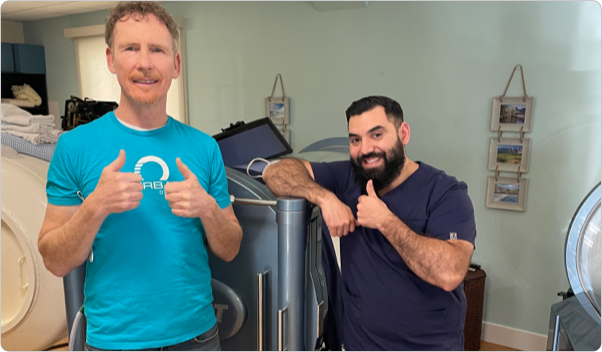HBOT heals Idiopathic Sudden Sensorineural Hearing Loss
The cochlea needs a lot of oxygen, and hyperbaric oxygen therapy (HBOT) can provide high levels of oxygen to the cochlea by dissolving it into the plasma. Oxygen is important for the cochlea to function properly, but sudden hearing loss can cause a decrease in oxygen levels. Normobaric hyperoxygenation is not as effective as HBOT for increasing oxygen levels in the cochlea.
Are you a Patient? View Patient version of this page

The cochlea needs a lot of oxygen, and hyperbaric oxygen therapy (HBOT) can provide high levels of oxygen to the cochlea by dissolving it into the plasma. Oxygen is important for the cochlea to function properly, but sudden hearing loss can cause a decrease in oxygen levels. Normobaric hyperoxygenation is not as effective as HBOT for increasing oxygen levels in the cochlea.
Are you a Patient? View Patient version of this page
How Hyperbarics Helps
Speeds recovery and rehabilitation
Reduces inflammation
Induces neuroplasticity
Mobilizes stem cells
Increases tissue oxygen delivery
Improves blood-brain barrier reactions
Upregulates axon guidance agents
Increases levels of neutrophils and nitric oxide
Enhances mitochondrial function (neurons and glial cells)
Stimulates angiogenesis and cell proliferation needed for axonal regeneration
What the Research Says
Hyperbaric oxygen therapy (HBOT) increases blood flow and transports more oxygen through the plasma to the inner ear and nerve cells, thus reducing hypoxia. HBOT has been shown to reduce inflammation and promote stem cell growth and mobilization. It is also bacteriocidal.
The cochlea and the structures within it require a high oxygen supply. HBOT dissolves extra oxygen into the plasma. Tissue oxygenation to these structures occurs via oxygen diffusion from cochlear capillary networks into the perilymph and corilymph. Perilymph oxygen tension decreases significantly with sudden sensorineural hearing loss (ISSHL). Although normobaric hyperoxygenation increases intracochlear oxygen tensions, only HBOT achieves extremely high arterial perilymphatic oxygen concentration in human and animal studies.
Patients who present with ISSHL, within 14 days and have a moderate or greater severity 40dB are the most likely to improve according to studies. However, The American Academy of Otolaryngology Head and Neck Foundation recommends considering treatment up to three months from the symptom onset.
Our experience reflects the studies. Early intervention with HBOT yields the greatest improvement. Additionally, we have also had some success with patients getting HBOT between the 14 to 90 day window of onset. See Clinical Practice Guideline: Sudden Hearing Loss Article below.
HBOT Treatment Recommendation
For sudden hearing loss, most physicians recommend 100% oxygen at 2-2.5 ATA for 90 minutes daily for 10-20 treatments. All patients have to return to their ENT to be tested to know for sure how much of their hearing they have regained. Most patients respond slowly, and some do not notice changes until they are near the end of their treatments. And there are those unfortunate few who do not regain their hearing even after all their treatments. There are some who regain enough hearing so they can hear with the use of a hearing aid.
Patient Experiences
Bay Area Hyperbarics has healed hundreds of patients with stubborn and non-healing wounds over the last 20 years.
-

Tomas, 67
Recovered most of her hearing from HBOT, where steriods didn’t help.
Wen was very upset when she lost her hearing in her right ear. She was given steroid injections in her ear by her ENT. Her ENT then sent her on to our clinic for HBOT treatments. She had slow recovery of about half her normal hearing starting at approximately her 10th treatment. Although Wen did not recover all of her hearing when she finished her prescribed treatments, she had recovered quite a bit of her hearing and did not require a hearing aid.
-

John, 42
Healed from sudden deafness and resumed work as a piano tuner.
John, was a colorful and lively man, who made his living as a piano tuner. He came into our clinic with sudden deafness and distressed because of course, hearing was critical for his livelihood and he needed to pay his rent. John was able to target the exact day that his hearing returned: After his 16th treatment, his hearing returned sufficiently so that he could return to tuning pianos! He was elated, and decided to continue with all of his prescribed 20 treatments, to regain the remaining of his hearing.
-

George, 65
Regained his full hearing capacity right after his fifth session of HBOT.
George experienced a remarkable and very unusual recovery in our clinic. During his fifth treatment session, he regained his full hearing! In our experience, treating sudden deafness takes time. Even though he regained his hearing, George decided to complete all 20 prescribed sessions to ensure the recovery was permanent.
Physicians: Refer a Patient
Refer a patient in three easy steps.
1
You Submit Your Patient’s Information
As a provider, your office fills out and faxes back the Patient Referral Form. Have questions? Call us!
2
We Get Authorizations
We ensure the patient understands the treatment and follows the prescribed protocol to get the patient on the road to recovery!
3
Patient Starts HBOT
Our medical staff meets with the patient to ensure that HBOT treatment is appropriate and contacts Medicare or private insurance to receive authorization.

Related articles
Check out the following articles, which may also be relevant to your search
Research on Hyperbaric Oxygen Therapy
To learn more about HBOT, take a look at our FAQs.
-
What is Hyperbaric Oxygen Therapy?
Hyperbaric oxygen therapy treats medical conditions with 100% oxygen in a pressurized hyperbaric chamber. The patient lies or sits in the chamber. The oxygen then saturates the plasma in the blood, allowing oxygen to easily flow throughout the body and reach even areas that are injured or diseased, which typically receive less oxygen. The mechanisms of hyperbaric oxygen therapy include stimulating and mobilizing stem cells, down-regulating inflammatory genes, up-regulating reproductive cells and stimulating DNA. HBOT also regrows tiny blood vessels, and stimulates the growth of new healthy cells in the brain, bones, skin, organs, and tissues. People seek hyperbaric oxygen therapy to heal physical damage in their bodies and to promoting health and anti-aging.
-
Does HBOT kill cancer cells?
Current research indicates that hyperbaric oxygen does not kill cancer cells. However, there has been a small amount of research indicating that hyperbaric oxygen might reduce the size of certain tumors. Also, there has been a study on mice using hyperbaric oxygen, along with a ketogenic diet, to reduce tumors. Hyperbaric oxygen causes many different healing modalities to kick into gear. Could its effect on strengthening the immune system inhibit the growth of cancer cells? Nobody knows. There are numerous studies conclusively showing that hyperbaric oxygen does not encourage cancer cells or tumors to grow. Some patients claim the hyperbaric oxygen makes them feel a lot more comfortable and functional after chemotherapy and also during healing. Note that some chemotherapy drugs are not to be used with hyperbaric oxygen, as the chemotherapy drugs can be enhanced and thus become toxic. A good hyperbaric oxygen facility (such as Bay Area Hyperbarics) will always call the chemotherapy manufacturer to ensure that hyperbaric oxygen therapy will be helpful and not damaging to the patient.
-
IWhat is the CPT code for HBOT?
The CPT code for HBOT is G0277.
-
Does Medicare cover HBOT?
Medicare covers Hyperbaric Oxygen Therapy for approved conditions, and many insurance companies also cover approved conditions. If your condition is not approved by your insurance, we can discuss our special rates. Give us a call at (408) 356–7438. We are happy to discuss your options with you.
-
Can HBOT help Neuropathy?
Hyperbaric treatments help heal neuropathy by regrowing small blood vessels and nerves that have died from disease, injuries from radiation and aging. Patients often experience numbness and or pain when they start treatment. Hyperbaric treatments most often bring back sensation and make, for example, walking easier and more enjoyable.
-
Why would a physician consider HBOT?
A physician would consider using hyperbaric chamber therapy under a variety of situations. Physicians most typically refer patients to hyperbarics when the patient is not healing with traditional medical interventions and hyperbaric chamber therapy is approved by Medicare for this condition. Some patients experience significant unresolved pain and unremitting disease states that the mechanisms of hyperbaric oxygen therapy in a hyperbaric chamber are known to affect, such as the down regulation of inflamatory genes. For an example, some patients have experienced severe, unremitting hives with itching, which did not improve with any specialists interventions. Some physicians will consider hyperbaric chamber therapy if the patient has no other good avenues for improving their failing health, and they know the hyperbaric chamber therapy is safe and will not harm the patient.
-
What is Hypebaric Oxygen Therapy?
Hyperbaric Oxygen Therapy (HBOT) Hyperbaric Oxygen Therapy (HB0T) is a medical treatment where you inhale 100% oxygen in a chamber with increased atmospheric pressure. HBOT injects 400x the oxygen into your tissues and bones and mobilizes stem cells. It regrows healthy tissues in the brain, blood vessels, skin and bones. It also reduces pain and swelling, and speeds recovery. It is simple, effective and painless.
Have more Questions?




